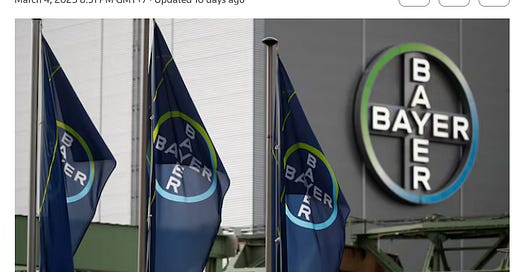S1.C10. TELL ME WHY -Bayer
Bayer faces a pivotal moment—financial losses, legal battles, and R&D failures threaten its future. Can it recover, or is this the start of a decline?
Bayer, a global pharmaceutical and agricultural company, is facing mounting pressure from investors to demonstrate effective turnaround strategies as it approaches its next quarterly results. Since taking over as CEO in mid-2023, Bill Anderson has implemented significant structural changes, including reducing managerial positions, streamlining decision-making processes, and eliminating bureaucratic inefficiencies. While these steps indicate a shift toward greater efficiency, investors remain skeptical due to unresolved challenges that continue to weigh heavily on the company’s financial performance and market reputation.
One of the most significant issues Bayer faces is the ongoing litigation related to its glyphosate-based weedkiller. The company has been entangled in costly U.S. lawsuits alleging that its product causes cancer. Since acquiring Monsanto in 2018 for $63 billion, Bayer has faced approximately 165,000 claims, with over 50,000 still pending. This legal battle has already cost the company billions in settlements, and the uncertainty surrounding future payouts continues to be a major concern for investors. In response, Bayer is seeking shareholder approval to raise equity capital worth approximately 35% of its outstanding shares, equating to around €8.4 billion, to cover potential litigation costs.
Additionally, Bayer’s pharmaceutical division has encountered serious setbacks. A major blow to its drug development pipeline occurred when a promising blood thinner failed in clinical trials. This failure has created a substantial gap in the company's pharmaceutical offerings, raising doubts about Bayer’s ability to maintain competitiveness in the highly lucrative but competitive pharmaceutical market. The loss of this potential blockbuster drug has left investors questioning the effectiveness of Bayer’s research and development strategies and whether the company can successfully innovate and introduce new, high-revenue products in the near future.
Beyond legal and pharmaceutical challenges, Bayer is also grappling with difficulties in its agricultural sector. The global agricultural market has been sluggish, and this downturn has negatively impacted Bayer’s Crop Science division. In 2024, Bayer reported a net loss of €2.55 billion, driven primarily by impairment losses in this division. Additionally, the company’s net financial debt stood at €32.6 billion by the end of the year, signaling the extent of its financial burden. Weak market conditions, coupled with declining sales and increased competition, have contributed to a projected earnings decline extending into 2025. Given the significance of the agricultural business to Bayer’s overall revenue, the company must find ways to navigate market challenges, improve efficiency, and differentiate itself from competitors to restore investor confidence.
Despite the restructuring efforts led by Anderson, investors remain cautious, demanding concrete results that reflect a real turnaround. Many are looking for signs of financial recovery and strategic success that will positively impact Bayer’s stock performance. The upcoming quarterly results will serve as a crucial test for Anderson’s leadership, as stakeholders seek reassurances that the company is on the right track to overcoming its challenges.
In conclusion, Bayer is at a critical juncture where strategic decision-making will determine its future trajectory. The company’s ability to resolve its litigation issues, revive its pharmaceutical pipeline, and navigate agricultural market difficulties will be key factors in regaining investor trust. As the next financial report looms, the pressure on Anderson and his team to deliver tangible improvements has never been higher. Bayer’s long-term stability and market standing will largely depend on its success in addressing these pressing concerns and executing a sustainable growth strategy.
A Fixable Crisis or a Long-Term Decline? 💊📉
With massive legal challenges, drug development failures, and financial struggles, Bayer is facing one of its toughest periods. Can the company recover, or is this the beginning of a deeper decline?
💬 Share your take and pick a question:
1️⃣ Could Bayer have avoided this? – Did leadership miscalculate risks, or were these setbacks inevitable? What smarter moves could have changed the outcome?
2️⃣ What’s the ripple effect? – How will Bayer’s troubles impact the pharmaceutical and agricultural industries? Will competitors take advantage, or will this create instability across the market?
3️⃣ What’s the path forward? – With financial losses mounting, should Bayer double down on R&D, restructure, or pivot its strategy entirely? What’s the smartest way to recover?
READ MORE SCORE MORE
PREVIOUS
NEXT







#3. My perspective is that the company should realign with its core mission: "Science for a Better Life." Instead of pushing forward hastily, a strategic pause to reassess and develop more sustainable scientific advancements will ultimately strengthen its position.
That said, not to sound patronising, this isn’t to suggest the company and its leadership aren’t already making efforts in this direction. However, for those studying this as a case, here are some key takeaways:
1. Evaluate & Streamline: Critically assess the current product range and "spring clean" where needed.
2. Invest in What Works: For products that have naturally gained traction, amplify their impact through outreach.
3. Support Ongoing Progress: If a product shows promising but incomplete results, continued investment is vital.
4. Encourage Unconventional Solutions: Innovation often emerges from unexpected problem-solution combinations—these deserve attention.
Ultimately, bringing common sense back to an organization that risks losing direction requires strong, decisive leadership. A leader who prioritizes thoughtful, mission-driven decisions will be instrumental in steering the company forward.
When in doubt- go back to the basics. The question : why do we exist?